Games. They came out. I played them. Here is my obligatory five-thousand word essay on the topic.
To be honest, I didn’t play them. Not all of them. Throughout the year it often felt as though there were fewer impactful game releases than in recent years. That may still technically be true – I haven’t run the numbers – but coming into the last several weeks of the year and in my preparations for our GOTY content, that impression really turned around. Suddenly there were numerous games I wanted to get through before our discussions, and several more I was never going to have the time to.
So it should come as no surprise to myself, nor anyone who has ever read one of my lists in previous years, that I’ll be starting with…
Games I Wish I Had Played/Played More Of
What was I even doing with my time this year? It sure wasn’t playing these!
- Gears 5: Jack and I rather enjoyed Act 1. Some day we’ll manage to schedule some time to knock out the rest.
- Outer Wilds: I dipped into the deceptively deep waters of Outer Wilds just enough to come to the conclusion: “I should really set aside some time to dive all the way into this”. That hasn’t happened yet, and I deeply regret that.
- Luigi’s Mansion 3: The universe conspired a couple of times to keep me from starting LM3. After that I kind of stopped trying and moved onto something else. I’ll get there eventually.
Honourable Mentions
These games didn’t quite make the cut for whatever reason, but still deserve some recognition.
- Baba Is You: The most delightfully novel, refreshingly clever, and devilishly frustrating puzzle game of the season.
- Neo Cab: An engaging and interesting take on dialogue trees with a weird and wonderful cast of characters. Didn’t quite stick the landing, but I certainly enjoyed the ride… or the rides. I provided. It’s a taxi game.
-
Hades: The absolute most I have ever revisited an early access game, by far. This has an all-but-guaranteed spot on my list whenever it actually releases. I assume next year.
- Satisfactory: There’s a good chance I’ve spent all the time I will with this game, well before it even got some major updates (let alone leaves early access), but damned if I didn’t throw myself into my sprawling factory (sometimes literally) and have a great time.
- Phoenix Wright: Ace Attorney Trilogy: Some of the best Japanese lawyer games I played this year. Aren’t these just a delight?
- Destiny 2: Shadowkeep: I had avoided jumping back into Destiny as I knew all too well how much time it would take away from all the other games I wanted to play. I was right to do so. Fuck you, Brunker.
- Apex Legends: Who’d have thought a battle royale game could come out in 2019, be successful, get me to play it and actually really like it.
- World of Warcraft Classic: It’s pretty much exactly as I expected, and I played it pretty much exactly as I expected. Outside of my recurring play sessions with Dom in Sunday Morning Classic, I put in a solid chunk of time over about a week, came back to it a couple of times when I was particularly bored or needed an easy escape, and haven’t touched it since.
Without further ado…
My Top 10 Games of 2019
10. Afterparty
Night School delivers once again with some of the most genuine character work in the industry, despite the outlandish concept in play here. The premise of Afterparty is simple: two friends find themselves in hell, and endeavour to out-drink the devil in order to return to their lives. Obviously, things don’t turn out so straightforward for them, as this isn’t just an endlessly looping drinking mini game, or some kind of… reverse Tapper. Hmm…
Along the way they encounter a bevy of entertaining characters, locations, and conspiracies. The backdrop is colourful and clever, the circumstances comical, and the interactions range from hilarious to incredibly and moving.
The traversal doesn’t work so well as in Oxenfree, with far less environmental or location based mechanics/plot points, so at times all the running back and forth can be a bit of a hassle. And while it often revealed some visually interesting landscapes, I usually found the camera to be too zoomed out to clearly see everything going on, or at least as much of the characters as I wanted.
Ultimately, this game is about the writing and performances though, and they’re top notch across the board.
This also brings me to:
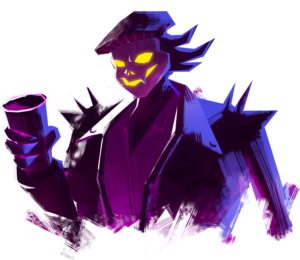 Top 3 Ashly Burch performances of 2019
Top 3 Ashly Burch performances of 2019
-
-
-
-
-
-
-
-
- Parvati Holcomb – The Outer Worlds
- Sam Hill – Afterparty
- Ash Graven – Final Space
-
-
-
-
-
-
-
9. They Are Billions
It’s been a while since there was a really good RTS to just sink my teeth into. The last RTS I can recall really enjoying was the final Starcraft II expansion, and even then I didn’t play much beyond the campaign, so there really wasn’t too much time actually spent there.
They Are Billions, however, was exactly what the doctor ordered. Okay, in this scenario, they’ve apparently prescribed a near-endless horde of zombies for which you are ill-prepared. They’re a terrible doctor. This doesn’t work. Maybe it’s a recipe?
Take some traditional unit command, base building, and exploration. Blend with some tower defence and wave-based challenges. Throw in a sprinkling of granular difficulty controls, a dash of tasteful steampunk aesthetics, and a sense of impending doom, and you’ve got yourself a great, oft-stressful, but ultimately exceptionally satisfying cake. Or… strategy game.
8. Ape Out
I’ll have to start with the obvious on this one. Damn, does this game have style! As soon as I picked this up, I thought to myself “well here’s our Best Style”. Ape Out was damned fun to play too, but just as much to listen to and look at, even to die in (2019’s death screen of the year).
Every aspect just works in such perfect unison. The Saul Bass font treatment and paper-cut environments, the constantly shifting textures, lighting and perspectives, the AI-driven dynamic improvisational jazz beats, the simple but satisfying controls, the frantic progression forward through a maze of pillars, corridors, gun-wielding assailants, animals, and viscera… and all packaged in this wonderful wrapper. *chef kiss*
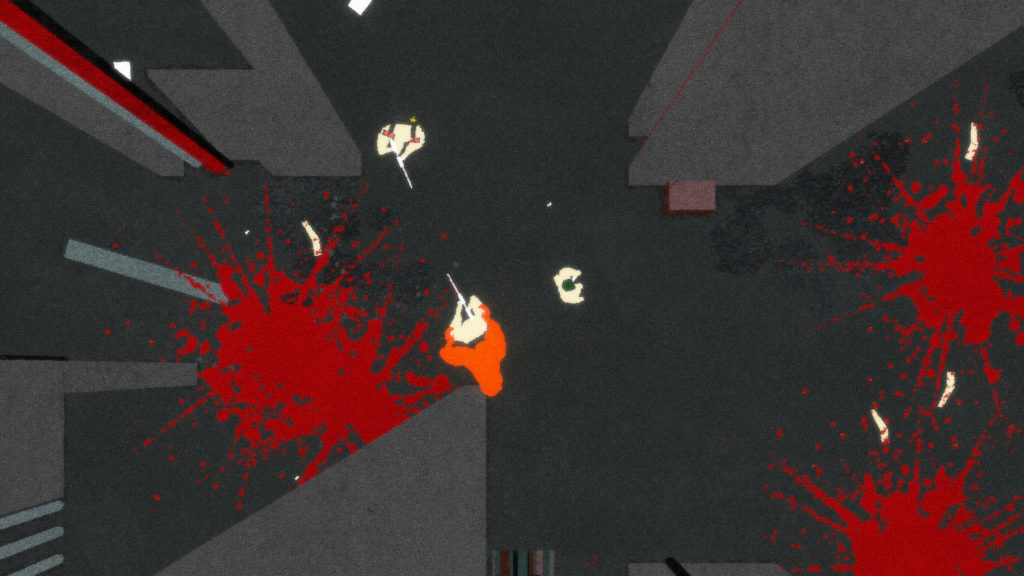
7. Devil May Cry 5
Internal Robots devotees may be familiar with my very correct opinion that Ninja Theory’s DmC: Devil May Cry is the best game in the series. For some reason, Capcom doesn’t seem to agree (or maybe it’s just large swaths of the internet). It stands to reason then that I approached this year’s return to the numbered series with great trepidation, naturally fearing that they would discard all the lessons they should have learned from the last entry.
Short of an actual follow up to DmC, I couldn’t be more delighted with the result. While definitely different from that of DmC, DMC5 still adopts a new, modern style of… style – and it lets you know straight away with some bombastic intros and title sequences. It backs this up with some appropriately great feeling combat, that looks just gorgeous, and maintains a fluid 60fps throughout.
The three playable characters actually play surprisingly different, whilst each being really fun in their own right. V, the new addition to the crew, is by far the most unusual play-style for the series – taking a largely hands-off approach as he reads poetry while directing his summons to reap havoc upon his foes. It’s weirdly satisfying though, and his personality at least makes for an interesting counter to the familiar attitudes of Dante and Nero.
The story is the usual brand of nuts, and not without some cheese, but does a pretty good job of driving characters forward and into each other’s paths, resulting in a rather cool use of some asynchronous multiplayer. Speaking of driving characters: Nico isn’t my favourite character by personality, but I fucking loved each and every instance of her smashing that van into places it shouldn’t be. Outstanding.
6. Judgment
Because we couldn’t go a year without a Yakuza game appearing on this list. I know, I know, it’s not actually a Yakuza game, but also it 100% is. And I am A-OK with that.
Judgment (also known by the better name of Judge Eyes) is a warm, familiar experience that comes with a fresh new perspective, set of characters, and an excuse to keep playing as many of these games as I do.
All the core concepts, tones and mechanics you know and love are there:
- A grand, intricate story with a great deal of tense drama, shocking reveals, and fun twists – with a whole new cast of great characters you can get to know. Seriously, this is one of their best stories to date.
- A slew of side-stories, from the weird and wacky to the heartfelt and touching – you also get a more plausible explanation for people coming to you with these in this private detective premise.
- A somewhat-mashy, but still satisfying beat-em-up combat system – with a fun new focus on manoeuvrability and interaction with the environment, including a healthy amount of [heat] actions. Although they do lose some plausibility here when this former-lawyer beats the crap out of everyone just as effectively as the Dragon of Dojima.
Anyway, it’s all there, with a fresh new twist on a comforting classic coming the form of criminal investigation and the practice of law – fun!
If I had one complaint with Judgment, it would unfortunately be with the detective/lawyer work. The mini-games they introduce for these segments – the tail, chase, and environment scanning – are largely unchallenging and pretty uninteresting after the first couple instances, and don’t really change throughout, resulting in a lot of repetition of the weakest part of the game.
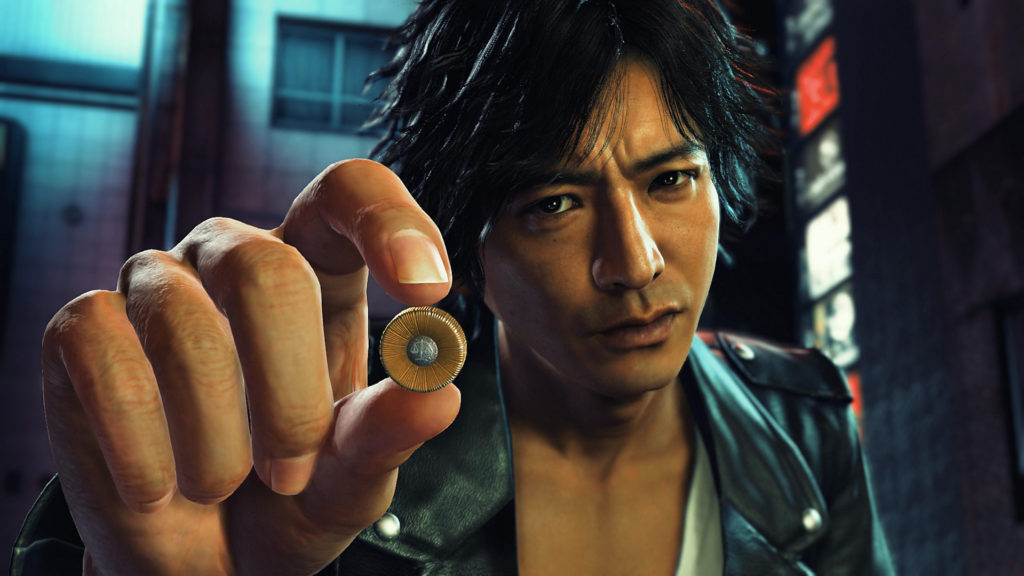
Any investigating you do is almost entirely on rails, though at least the discoveries are generally interesting or entertaining. The courtroom scenes are engaging through story and character, but the instances where you get to present evidence are few and far between, and there’s no real stakes or challenge in these either. Sure, Yagami isn’t a practising lawyer anymore, but come on; I wanna yell “Objection!” in a Japanese courtroom and present the correct piece of revelatory evidence to a gasping crowd. Is that so much to ask?
It’s a shame that the biggest departures from the Yakuza series are ultimately the weakest aspects, because they continue to absolutely nail all the other stuff, and while you can get past this pretty easily given the pretty limited number of occurrences, that’s really not the desired solution here. In a sequel, I’d much prefer them scaling down the action (by the end I really wanted to just get from A to B through Kamurocho, not fight three groups of a dozen angry gangsters for the hundredth time) and a lot more legal shenanigans, should they come up with a way to make those more challenging and fun. But surprise, even if they don’t, I’ll be back for more Judgment.
5. The Outer Worlds
Through the bulk of The Outer Worlds, I thought it was going to be a strong contender for my number one. It makes a very strong first impression, and continues to deliver on that for many hours as you progress from location to location. A better-playing Fallout game, with a more focused, hand-crafted story and setting, some beautiful, fantastical designs blended with some old-timey aesthetics, and the promise of some meaningful choices.
Edgewater makes a solid case for the rest of the game to come, as it is pretty much a microcosm of the Halcyon solar system and it’s problems that you find yourself in. This slowly failing corporate town is home to Parvati and Vicar Max, probably the two strongest companions in the game (with Parvarti being one of my favourite characters of the year – also, see: Top 3 Ashly Burch performances of 2019). It’s also the setting for this feud between the slimy board-appointed Reed Tobson and the rebellious green-thumbed Adelaide McDevitt, who has led many inhabitants out and into their own settlement. This all seems pretty black and white. Corporation bad, freedom and nature good. However, the more you dig into it, the more shades of grey seem to appear – and some of the most powerful of these are offered up by Parvarti at the moment of your monumental choice for the area, a really cool moment. If you’re so inclined, and you play your cards right, and happen to pass the right skill checks, you can find a way to walk a grey-er line. It’s pretty satisfying to achieve, more so knowing that you can also totally miss the opportunity to do so.
As I said, this is highly representative of the game as a whole. You’ll skip into town, get a feel for the underlying or bubbling conflict, and attempt to charm or brute force your way into enough information or through enough character stories that you know where you stand on the matter, before conniving or imposing your will upon the relevant factions. For the majority of locations, this formula works. The stories of both the individuals and factions involved, and their impacted peoples, are varied and creative (whilst remaining thematically consistent) and offer generally interesting comprises if you wish to pursue them (which are all quite satisfying to pull off).
There are some great smaller, self-contained quests and locations to undertake and explore. These contain some really great character moments, side-stories and environmental story telling, many of which subtly feed into the overarching plot in some pretty clever ways.
The skill system is a great advancement on the established norms, with whole trees of dialogue differing based on certain levels of skill, opening up a whole bunch of really funny and clever options. The way temporary effects of substances or debilities can effect these stats is also really neat. It all pairs nicely with some excellent writing and performances throughout.
The combat is pretty fun for the style of game, with a good variety of weapons and armour, with some really cool unique variants to discover too. It all feels a little too easy a little too quickly though, and doesn’t offer too much motivation for changing up your weapon choice or play-style. The companion’s combat options are functional, but largely inconsequential. The upgrades are mostly, regrettably, the same.
Where The Outer Worlds finally falters is in the tail end, starting in Byzantium. The final key location is unfortunately the least interesting and inspired (across design, content, and story), contains little character development (with the exception of a great scene for Ellie), and pushes you into a somewhat contrived interaction with some of the major players behind all this. The big reveal of what’s really going on in Halcyon is fun to piece together along the way, and definitely tries to place itself into the same shades of grey the previous locations and issues achieved, but the “bad” side goes too deep into comically evil, and the ultimate resolution is largely unaffected by your previous choices – you can throw it all away and flip sides with a single choice. Then it all ends rather abruptly and unceremoniously, and throws a pretty weak slide show of your deeds at you. It’s a let down, and of a disappointingly common nature for a game that otherwise executed so well and made such strong changes to the genre.
4. Bloodstained: Ritual of the Night
Sometimes games are just pure, ridiculous fun. Bloostained is unapologetically just that. The story may be rote tripe mixed with nonsense, the dialogue and voice acting may be frequently laughable, and some of the enemy designs just straight up don’t belong in the game, but all of that is so completely unimportant in the shadow of this game’s ceaseless systems of unnecessary variety and depth, all working in this bizarre cacophony of beautiful chaos to create a unexpectedly joyous and engaging experience. And this is coming from the “story guy”.
The sheer volume of weird and wonderful abilities and weapons is impressive enough, but for so many of them to be so incredibly fun to use and combine and swap between… it’s amazing to behold. Coming into this, I really thought I’d be playing what was promised: a classic Castlevania game. I’d have my weapon preference, my spell preference, and I’d smash through the main progression, with a nice bit of exploration along the way.
What I got was a game I poured hours into farming cooking ingredients, levelling up shards, exploring every corner of the map, defeating every possible enemy and optional boss, creating the most ridiculously broken character I could, and working towards the most complete ending possible. Honestly, if I hadn’t come to this game so late the year and had other titles to get to, I would have almost certainly 100% completed every aspect of this game. I still might – I’m not all that far off.
Bloodstained: Ritual of the Night is a very silly game, that has no problem completely breaking itself with some later abilities, weapons, or levels of skills, and it does so with glee in the service of creating an immensely fun game.
In stark contrast we have my #3…
3. Disco Elysium
The more I think about Disco Elysium, the higher it creeps up my list. This game offers such a weirdly beautiful blend of the brutally powerful, hauntingly macabre, astonishingly clever, and wonderfully silly. This is achieved extensively through the writing and core skill-check-based mechanics, only natural given the genre of game, but this is carried through into its art-style, equipment, voice acting and soundtrack too.
My complaints are limited. The art is often interesting and definitely evocative, but frequently difficult to parse. The music is apt and at times powerful, but very limited considering how much time you’re spending in these spaces, so ultimately grows very repetitive. The movement and the point-and-click interaction with the world is functional, but little more. These few points pale in comparison to what this game does right though.
Other than a couple of brief moments where I simply could not quite divine which of the many available threads to pull next, I was constantly being led through an exceedingly flavour-rich city block that presented as a microcosm of a much larger, grander – but equally conflicted – world. Whether it was the local political strife, the regional history, the personal qualms, or the core murder investigation, I was endlessly intrigued by the world that ZA/UM had placed me in – and positioned in such a way that I could learn as little or as much as I liked on a topic, whilst also shaping my character and my perspective of the world by doing so.
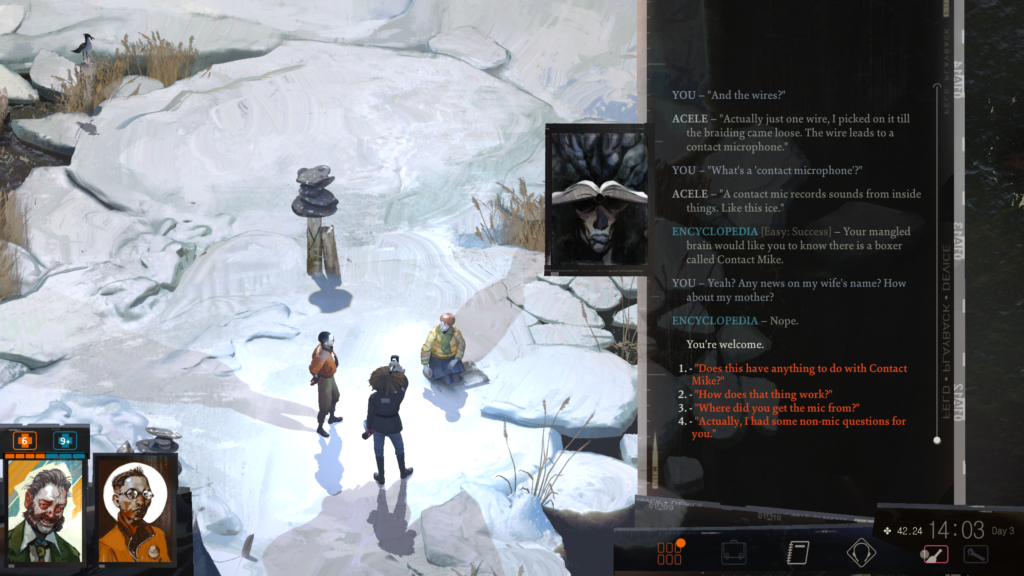
The way Disco Elysium weighs and reflects your decisions, large or small – sometimes in the background, sometimes in your face, or more often than not gradually flowing from one to the other – was a new and unique experience for me. More impressive than just that though; they almost exclusively nail it.
The degrees of differences and combinations in choice, character and progression they account for as you continue to mould your amnesiac detective in your desired image is astounding when you consider it. It makes for an incredible sense of ownership over your character, and really allows for some of the most powerful character moments in video games.
The way your various character aspects converse with you, with each other, is fascinating, entertaining, humorous, and powerful. The way they can develop (for better or worse) along with your ideas and ideals, and can actually mislead you or provoke you or calm you… it’s tremendously well done. There were multiple moments within this game that I dreaded selecting a dialogue option (and was often warned against it by some part of my psyche), but just had to do it. I had to know. The game also features a completely missable and unexpected scene that contains the most genuine and affecting conversation about a relationship I’ve ever experienced in media. It haunts me still.
These are all grand words, and the developers have surely earned them, but ultimately for me it comes down to this: No other video game this year made me laugh, think, feel, or reflect upon the very nature of the world, myself and others as much as Disco Elysium did. It’s truly something special.
2. Fire Emblem: Three Houses
Three Houses takes the Fire Emblem series to incredible new heights, which as a huge fan of some of their previous entries I can tell is is no small accomplishment. The ever-satisfying and always excellent core combat mechanics remain in essence, but are refined and enhanced through a slew of intelligent changes that add due depth to the classic weapon triangle system. It’s a welcome expansion that keeps things fresh for the series, but takes nothing away from it either.
Where Three Houses really shines above the rest is through the whole other half of the game: the fantasy school teacher simulator. I know, I know, that sounds ridiculous, and I was dubious on my approach of this game. But worry not! They somehow turned this weird interstitial cathedral grounds setting into the best part of a tactics game.
First, you’re asked to choose a house. You do this based on a 2 minute conversation with the house leaders, in which none of them come off ideal. Thankfully, you’re then provided with a brief run down of the plethora of characters that populate the school, and which houses they occupy. Unfortunately, they all seem like a bunch of predictable stereotypes on this initial pass, with one or two more intriguing candidates in each house , so I guess this is gonna suck regardless.
Or not. Turns out there’s no wrong choice. Most of the characters have fascinating depths that go well beyond or contradict their presented archetypes, and you get to gradually discover this with as few or as many characters as you like – and it’s any of them, not just your chosen house members. A surprising amount of character interactions are quite touching and engaging, often amusing, and occasionally mysterious. I came to really care for my crew of wacky misfits, original and recruited alike. I even came to quite like a number of the other students whom I didn’t manage to recruit.
Developing these relationships and these characters is also strangely fun and fulfilling. From selecting interesting pairings of dining partners, to hand-selecting their training regimens, the game does an excellent job of making you feel invested in these characters, and giving you the ability to shape your ideal war party. Because, oh yeah, we’re going to war.
Outside of the day-to-day tea parties and fishing trips, and pushing you into the beautifully crafted combat scenarios, is a wrapper of this grand, multi-kingdom spanning tale of warring factions, rebellions, betrayal and insidious plots. More than that, all of these are told from multiple different perspectives. Even more than that they actually branch in different directions based on whose perspective you’re playing from. And even one notch more than that, some of those branches don’t even deal with the actual underlying, even-grander, century-spanning, divine epic that is playing out in the background. Not only is all of this surprisingly well written, involves many of the huge cast of characters in a mostly satisfying way, and sprinkles in intrigue, mystique and payoffs throughout, it’s just a ridiculous endeavour to even undertake, let alone pull-off. Which they do.
One of my favourite things Fire Emblem: Three Houses accomplished was in generating our discussions of the different paths we each took with our houses, the different characters we were able to get to know, or the vastly different places their stories took them. Few games could claim the vast breadth and depth of Three Houses‘ gameplay, story, characters and timeline, and none that I know of could claim to do such an excellent job across all of those aspects.
1. Control
Instantly hooked. That’s Control. From the very opening when you walk into this unattended bureau building, pick up a weird memo about not bringing in archetypal pencils, and wander around an office space until you meet the Swedish janitor who runs the place, and wind up stepping out of the non-euclidean architecture back to where you started. I was entirely onboard for whatever it was Control wanted to show me.
It did not let me down.
Control, first and foremost, is an accomplishment in tone, atmosphere, and world-building. From the weird, bureaucratic, antiquated-by-necessity office building full of paper-pushers documenting the paranormal objects and occurrences of the world, to the shifting, impossible-to-hold-onto-or-rely-on nature of The Oldest House, or the sinister, ever-present and chanting, oft oppressive Hiss occupation of this increasingly familiar space – it is all impeccably crafted, captured and presented through outstanding level design, sound design, lighting, FMV, and animation. This is propelled to exceptional new heights through what I consider to unequivocally be the very best of storytelling through collectables to be found in video games.
The character work – both in writing and performance – is nuanced, engaging, and works in perfect cohesion with the world that you are discovering around you. Particular praise is to be heaped upon the protagonist of Jesse Faden (Courtney Hope), whose supply of subdued but appropriately-toned reactions to the bizarre happenings she finds herself in the middle of were a constant demonstration of what a player-character could be – allowing for the development of real relatability through unobtrusive one-liners and reactions, rather than dumps of expositional ham or characterisations only found in cut-scenes.
Dr. Casper Darling (Matthew Porretta) too is a beautifully portrayed character, one that is a constant source of subtle, clever humour, story-driving revelations, touching character progression, and just straight up entertaining world-building. This is made all the more impressive in light of the fact that you never even meet or interact with him throughout the game.
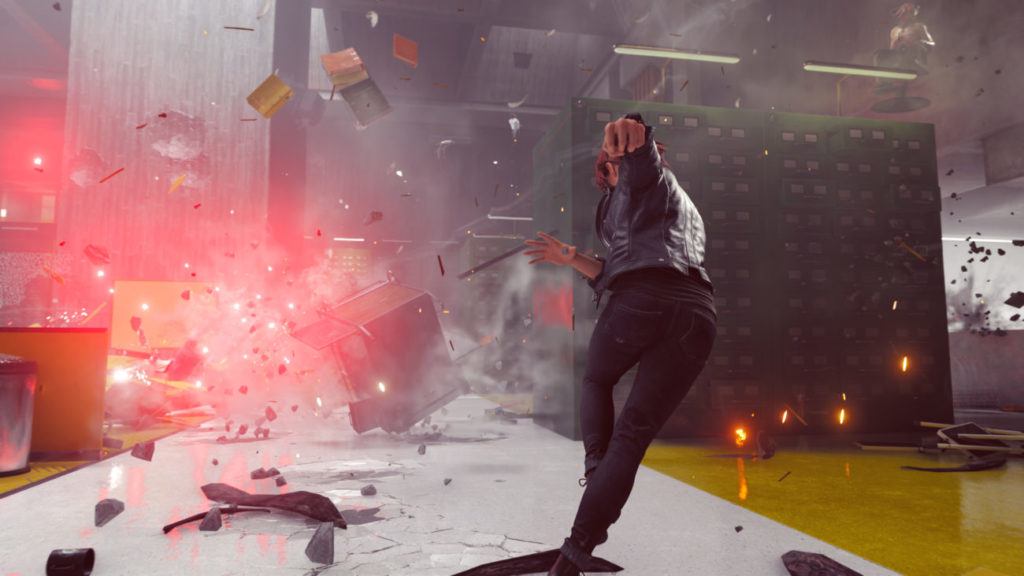
Then there’s the combat. Control is not the best shooter ever, but the core is solid and enjoyable, and certainly does good enough job to get it through. The concept and animation of the transforming gun, the various different forms it can take, and the lack of reliance on ammo make for one of the coolest weapons, if not always quite the best handling. The gun upgrades and mods are various and sundry, catering to a wide variety of different play-styles and combinations with powers. My only complaint there would be that you pick up so many of them and your inventory is so limited – it occasionally becomes a hassle.
Where the combat really excels is in the powers and abilities. It takes a little bit before you get a couple of powers, but once it starts doling them out, you have a full arsenal in pretty short order. From there, you are free to level up the powers of your choice (with some neat variants), find a good combination with the guns and mods of your choosing, and ultimately develop your own, fun approach to combat. But let me tell you – that approach better involve throwing stuff. The more the better.
Launch is perhaps the most satisfying ability in video games this year. It’s telekinesis, so that’s already cool, but it’s also quick to fire off, the targeting is snappy and simple, and it’s super effective at dealing with even the most threatening of opponents. What really sets it apart though is Remedy‘s commitment to letting you grab just about anything in the environment – desks, lamps, filing cabinets, enemies (dead or alive), or just straight up chunks out of the wall or floor if there’s nothing else on offer – and fling that thing at whomever’s in sight with the force of a fucking truck. It feels so damn good.
As far as the other powers go, you can use them to taste. Evade makes for a satisfying and effective quick dodge, Shield is essential when you’re caught in a spot or can be used tactically against the nastier projectiles, Seize is as fun as about any turncoat ability can be (and really helpful for some of the larger groups), and then you’ve got Levitate. Oh yeah, you can pretty much just fucking fly in this game. It’s feel great, is really easy to jump in and out of, and can be combined with certain mods for some devastating moves.
The main storyline does a good job getting you in the door and propelling you through this metroidesque progression within The Oldest House through a deft blend of mystery, intrigue, strong characters, and personal development/investment. The end left me a little unsatisfied, though largely due to the anti-climatic and somewhat tedious final encounter that (for a game that has a bunch of boss fights) strangely didn’t end in a boss fight.
Along the way are a number of distractions from the main path. Some are among the best moments the game has to offer, others seem a little detached and intrusive on the natural flow of the game, but all are up to you whether or not you wish to engage with them. The world is well worth exploring, and there’s a surprising amount to explore, but by the end of the game some of the side encounters can start the draw on a little long or feel a little repetitive, which can ultimately deter from checking absolutely every corner (despite most corners containing some neat bit of flavour).
I must also address the performance issues Control has/had at launch. While it has been patched and performs a lot better now, the base consoles really struggled with any combat encounter with more than a couple enemies. I foolishly didn’t play this on PC for no good reason, as seeing it run there is genuinely breathtaking (especially with ray-tracing). It does, however, really speak to the amount I enjoyed Control that I persisted in playing it in spite of these issues. I only stopped once the performance patch was announced, and gleefully returned once it was released.
Control is a fantastic concoction of best-in-class world building, tone and atmosphere, stunning visuals and audio, thrilling and satisfying combat, and amazing character writing and performances. Remedy at it’s absolute finest. I eagerly await playing more with the upcoming DLC.


One thought on “David’s Top 10 Games of 2019”